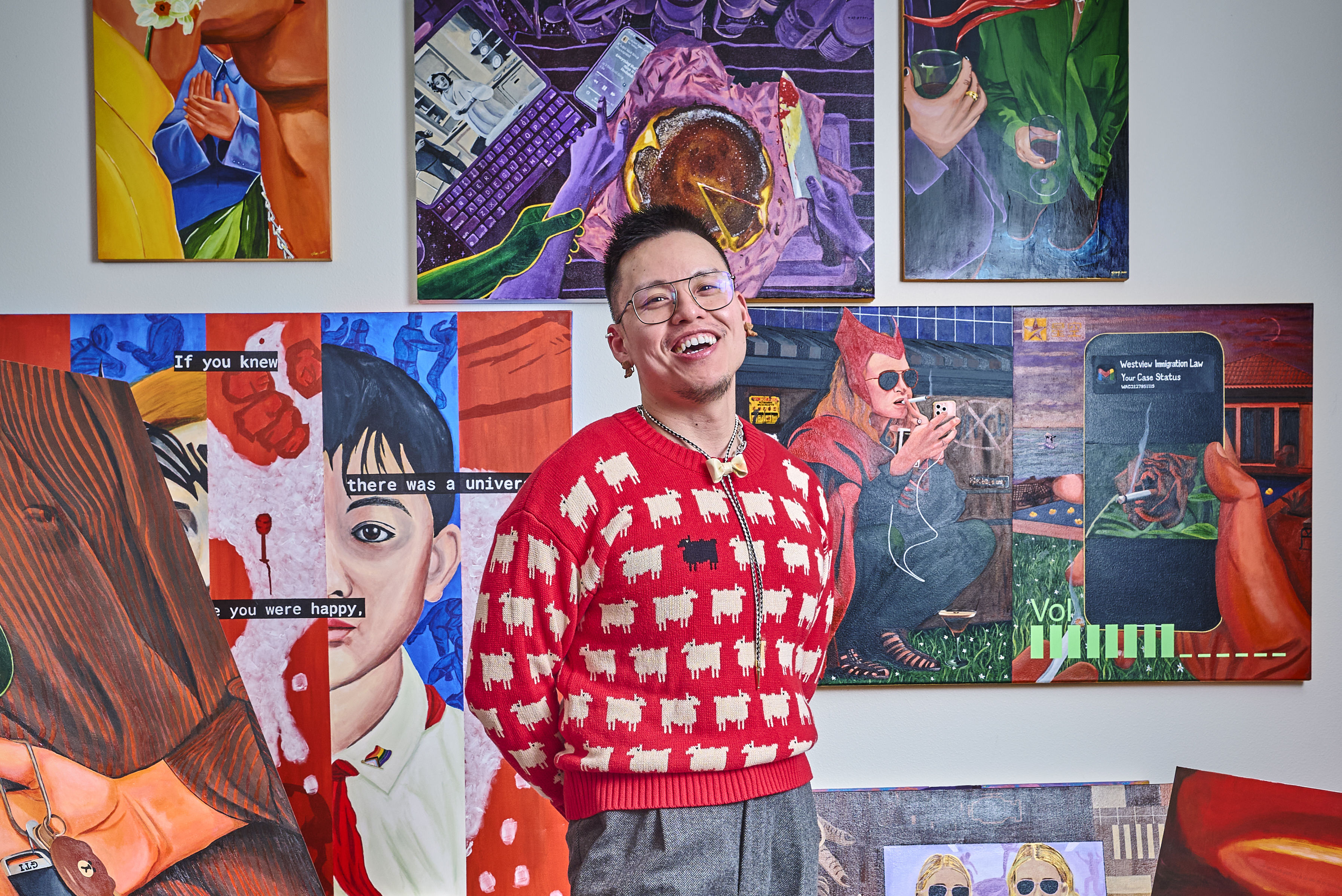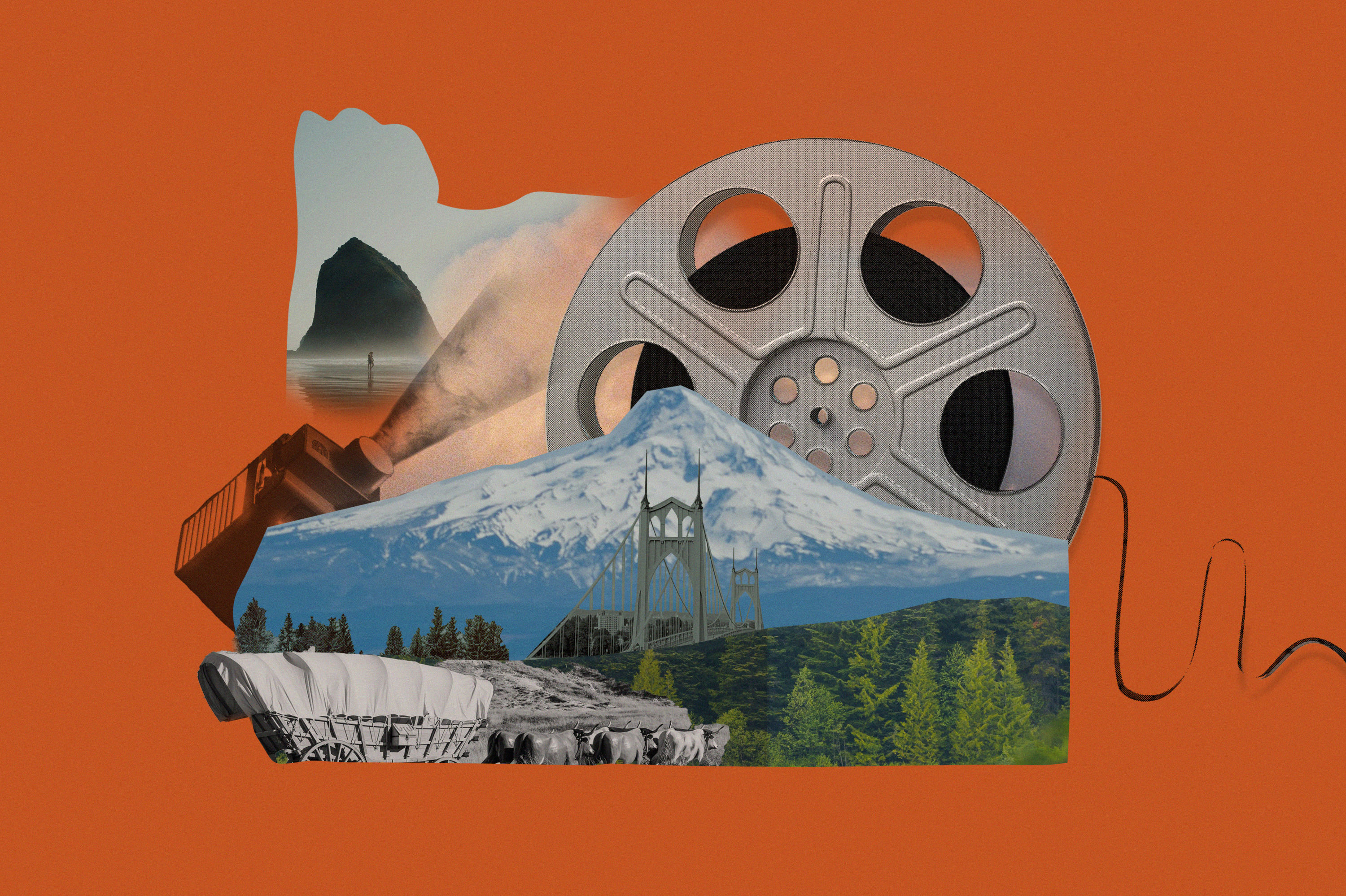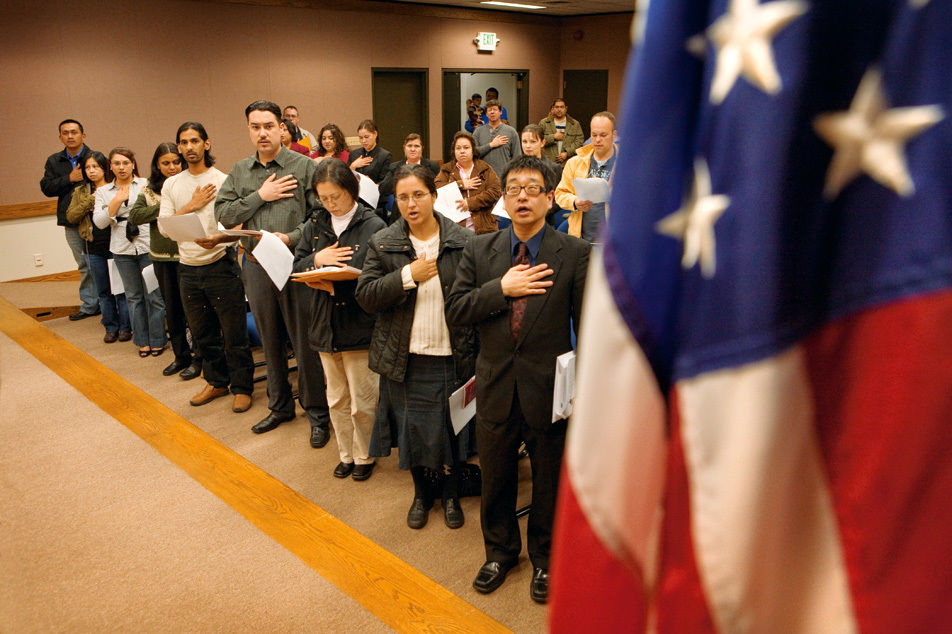
Coming to America
THE CEREMONIES COMMENCE at precisely 10 in the morning and 2 in the afternoon, so the immigrants begin to arrive at 511 NW Broadway about an hour before. Since March 2003, this gothic-style edifice, once Portland’s main post office, has housed the Department of Homeland Security’s U.S. Citizenship and Immigration Services (USCIS), formerly known as the INS. This is where most of Oregon’s foreign-born residents, whether they live in Beaverton or Pendleton, must come in order to become full-fledged U.S. citizens.
Through the metal detector at the entrance and up a flight of 38 marble steps is the place known, simply, as the “ceremony room.” It has burlap-colored fabric walls, a drop ceiling buzzing with fluorescent lamps, a sea of beige carpet, and six dozen government-issue chairs arranged before a stage on which sits a podium, an American flag, and a television set. Some of the people who arrive have pinned red, white, and blue corsages or American flags to their lapels. They wear dresses, suits, burkas, turbans, cowboy hats, baseball caps, blue jeans, T-shirts, heels, work boots, sneakers, and sandals. Some shush fussy babies; others lean on canes. Nearly every chair contains someone murmuring in a language other than English: Spanish, Vietnamese, Cantonese, Russian, Korean, Hindi, Kirundi.
Preceding the Oath of Allegiance, immigrants watch a video montage of Ellis Island images set to “America the Beautiful,” followed by a videotaped message from George W. Bush (“With a single oath, all at once, you become as American as the most direct descendants of our founding fathers”). Last comes a video of newly sworn-in citizens waving flags; “God Bless the USA (I’m Proud to Be an American)” plays in the background.
In 2006, 4,638 immigrants became new citizens in this room, and, on occasion, at other venues like the Hatfield Courthouse. Last year, that number increased slightly to 4,977. This year, the Portland USCIS projects the number will reach more than 10,000—so many that the office, which used to hold just one naturalization ceremony per day (at 2 p.m.), has had to add another one.
Whether the spike in attendance has been driven by economics (the fee for citizenship applications recently jumped from $320 to $595, and many wanted to file paperwork before the price went up), immigrants’ desire to vote in an election year, or the recent crackdowns on illegal aliens, Portland USCIS field office director Bill McNamee says that he’s been busier only once in the 30 years he’s worked in immigration. (That was the three-year period from 1998 to 2001, when he processed 45,000 refugees for resettlement to the United States during the breakup of Yugoslavia.) “I’m so fortunate to get to see this,” says McNamee, who was posted to Portland in 2001.
From 1990 to 2006, the U.S. foreign-born population nearly doubled, from 19.8 million to 37.5 million. In 2006, 12.5 percent of the nation’s population considered itself to be foreign-born, the highest percentage since the 1930s. According to the U.S. Census Bureau, in Oregon, where immigrants make up 9.7 percent of the state’s population, the number of foreign-born residents skyrocketed from 139,307 in 1990 to 359,867 in 2006. During that same period, Portland’s immigrant population more than doubled—from 33,601 to 75,098—and now represents 13.9 percent of the city’s total population. Maps from the most recent census, which track foreign-born residents by zip code, show the highest concentrations of immigrants living in pockets of Beaverton, Rockwood, Happy Valley, Cornelius, and Hillsboro. In these communities, the number of foreign-born residents averages 21 percent, a level of diversity that’s on par with metropolitan Chicago. In Gervais, a predominantly Hispanic enclave near Woodburn, 32.4 percent of all residents are foreign-born.
Not everyone embraces the trend. “Our country has a right to say we can’t accommodate any more people,” says Jim Ludwick, president of Oregonians for Immigration Reform, an organization that wants to limit the number of immigrants moving to the state. His group is sponsoring an initiative for the November ballot that would nullify part of an Oregon statute that prohibits police from arresting anyone whose sole violation is being in the country illegally.
Despite such efforts, or perhaps motivated by the nationwide backlash against immigrants (even against those who are in the country legally), more and more people convene at 511 NW Broadway every day. At the appointed time, candidates stand in three rows at the front, their backs to family and friends, and raise their right hands. Before he administers the oath, McNamee, standing beside an American flag, delivers a brief speech.
“Diversity is our strength,” he begins. “In this room, there are some who came to the United States seeking a basic freedom they could not experience in the country they came from. Some came here to be with family members; others to pursue economic opportunity. Each of you has a story of how you came to America.”
Exactly 478 immigrants were naturalized in Portland from April 23 to May 2 this year. Here are six of their stories.
Joe Apperson
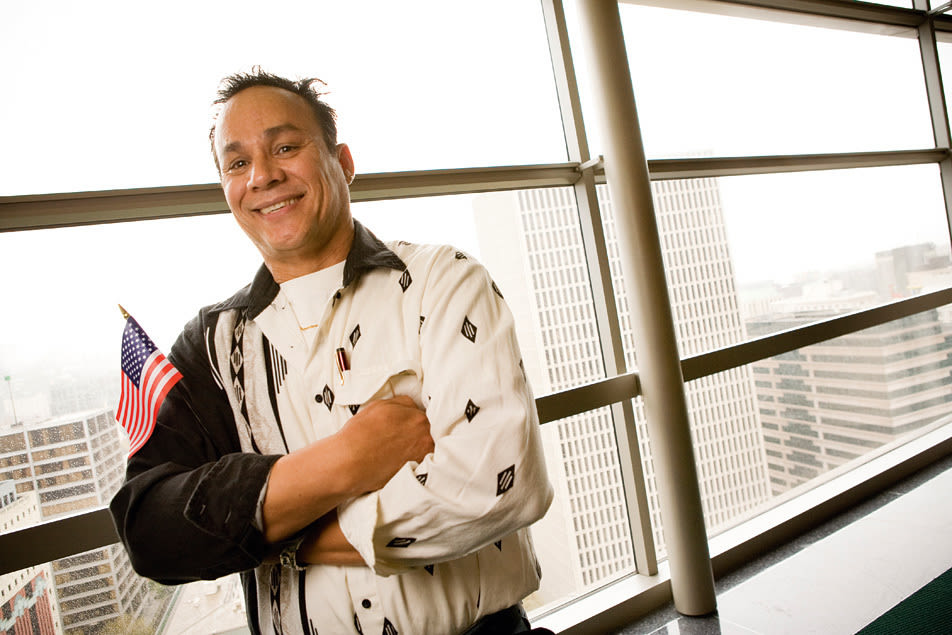
Image: Pete Stone
I WAS BORN ON January 4, 1959, in Olongapo City, near the U.S. Navy base at Subic Bay. My mother was named Rosaria Murillo, and my father was an American sailor named Jack Apperson who was stationed at Subic Bay, but I never knew these things until later in life.
I grew up with a different family, in a town in the province of Tarlac, north of Manila, and though I didn’t know my background then, I remember kids called me “White Fish” because I looked more American than Filipino. I even looked different from my brother and four sisters. My skin was a lot lighter than everyone else’s.
One night, when I was 7, I got in a fight with one of my sisters, and my dad yelled at me, “You are not our son! You are just the son of a buffalo!” That’s when my mom showed me two black-and-white pictures: a wallet-sized photo of a man in a sailor suit and a snapshot of a woman that had been taken at my baptism. “Here,” she said. “This is your real mom. This is your real dad.”
She said that after my mom got pregnant, my dad offered to marry her and take her back to America. But she was from an important Filipino family, and she refused to marry my dad because he came from a family of farmers. The day before I was born, Jack Apperson was sent to Vietnam, so he never got to see me. He never knew if I was a boy or a girl. My mom met another sailor and went to America with him. But she left me in the Philippines with her very good friend—my stepmom.
My stepmom never saw or heard from my real mother again. But she kept a note that Rosaria Murillo had written to me. It said, “When you grow up, I hope this letter will help you. This is a description of your dad: He has a burn on his back on the left side. When your father was 7 years old, his dad, that’s your grandpa, he was burning weeds on the farm and your dad fell into the fire. Your dad has green eyes but sometimes they turn blue.” That’s it. That’s all she wrote.
I kept the picture of my mom and dad by my mattress, and each night when I went to bed, I kept saying to myself, “I will find you.” My stepparents said that after I learned the truth about my past, I became a different person. It’s like I was done being a kid. I wanted to be an adult. I wanted to find my father. Every time I went to school, I told the kids I played with, “One of these days, I’m going to be gone. I am not from this place.”
When I was 14, I left home and went to live by myself in Manila. I worked as an elevator operator, a janitor, and a waiter at a catering company. With all those jobs, I was making maybe $20 a month, but I was saving all of my money so I could come to the United States to look for my father.
In 1984, I heard they were hiring Asian workers in the Middle East, and I found a job with good pay at a factory in Saudi Arabia. After seven years there, I had saved enough. I went to Boston because I had some friends who happened to live near the Central Library in Copley Square. Every morning at 7 o’clock, when they left for work, I sat in front of a microfilm machine, looking through hundreds of military records until the library closed for the night.
It took me a week, but finally I found the name, “Jack Allen Apperson,” a sailor who had been stationed in Subic Bay in 1958 and who now lived in Prineville, Oregon. I wrote down the address and the phone number and bought a phone card.
That night, I could not sleep. The next day, I dialed the number. A woman answered and I asked for Jack Apperson, and she said, “Yeah, he’s here,” and put him on the phone.
I said, “Hi, this is Joe Apperson. I don’t know where to start.” I told him the story my stepmother had told me. I told him about the letter left by Rosaria Murillo, that my dad had a scar on his left shoulder, and that he had green eyes that sometimes turned blue.
And he said, “I don’t have a kid in the Philippines. I don’t know what you’re talking about. I have nothing to say to you.” He put his wife, Pat, back on the phone.
“Why are you doing this?” she asked. I said, “Ma’am, I’m not asking for anything. I have a good job in Saudi Arabia and I had to spend a lot of money to come here. My only intention is to find out if this person is my dad. If it is not him, I swear to you I will move on.”
She asked me to call the next day. When I hung up the phone, I sat in the corner of the bedroom where I was staying in Boston and cried, because I just knew it was him. I kept saying, “Thank God I got the right number. I found the right person.”
Jack and Pat lived in Prineville, but they had an appointment in Portland a few days later, and they agreed to meet me at the airport there. But when I got off the plane, only Pat and her daughter showed up. They drove me to the Veterans Administration hospital in the hills above Portland, where Jack was recovering from skin graft surgery. After all those years, he was finally fixing that scar on his back.
When I walked into his hospital room and saw the face of the person in the bed, it was like I was looking at the picture that I’ve had ever since I was a boy.
“How are you doing?” I said.
“I’m fine,” he said.
I said, “I’m Joe Apperson.”
And then he said, “Yes, you are my son.”
He had tears in his eyes. Me, I cried and gave him a hug.
I stayed with him, sitting on the edge of his bed, and we talked all day and through the night. All the questions that I had when I was growing up were answered. I was supposed to be at the airport the next day. But Jack asked me to stay for a while—so I could meet the rest of my family.
After two weeks in Prineville I was supposed to return to my job in Saudi Arabia. My dad drove me back to Portland, but when he left me at the airport, he didn’t say a word. No “thank you” or “I’ll keep in touch.” Not even a goodbye. My flight ended up being delayed, and I was so upset that I called my dad’s number while I was waiting.
Pat answered the phone, and I asked her, “How come my dad just dropped me at the airport like I was a piece of luggage?” She explained to me, “Your dad was crying. He wanted to, but he just couldn’t say to you, ‘Don’t leave.’”
That was 17 years ago. Now I live in Metolius, about 45 minutes away from Prineville, and we’re always together. Jack Apperson is my father, but he’s more like my best friend. I’m proud of him, and I think he’s proud of me, too, because whenever he introduces me, he always says, “This is my son; he was born in the Philippines.”
But today I can say I’m an American, just like him.
Abeer Sawwaf
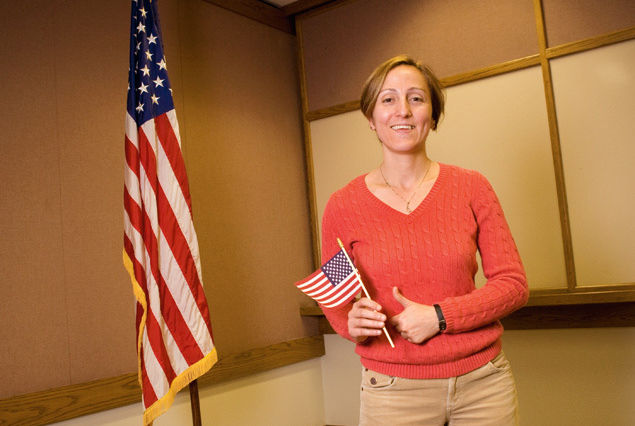
Image: Pete Stone
I WAS BORN IN Beirut in 1974, just before the Lebanese Civil War. What they were fighting about and who was fighting whom gets complicated, so let’s just say I lived with war throughout my childhood and into my adulthood. It was hard. I remember playing inside and hearing gun battles in the streets. Our house would shake from the bombs going off. When that happened, everybody in our apartment building would run down to the basement shelter. Sometimes we’d be there for 20 hours, and me and the other kids would make stuff—craft projects—and the bombs would be going off.
On July 17, 1981, when I was 7 years old, the Israelis began bombing apartment buildings in Beirut. They said they were targeting offices of the Palestinian Liberation Organization, which had been launching attacks on Israel, but 200 civilians were killed and 600 were wounded. The fighter jets were shrieking overhead as we fled to a house we had in the mountains just outside of the city. One thing I remember quite vividly is when I woke up, I looked down on the city, and the sky was glowing red from parachute flares. You’d hear a jet, then you’d see a light flash, and then a building going down. Now I think about it, and I’m like, Wow. The war didn’t kill me. I survived.
I got my medical degree from the American University of Beirut in 1998, interned for four years, and left in 2002 for my residency at OHSU. I took just one suitcase, thinking someday I’d move back to Beirut. But everything just sort of fell into place for me. I married an American, we had a baby, and today I became an American myself.
I didn’t realize how much I loved Beirut until I returned with my son Amir—his name means “prince” in Arabic. Beirut is by the sea and is just so beautiful. Now we go there every year to visit his cousins and his grandparents.
I became a citizen so I wouldn’t have to worry about having to renew my green card and my visa. It simplified my life. As a citizen, I will respect and protect this country, but that doesn’t mean I will forget my heritage. Every American comes from somewhere, right?
Galdino Hernandez-Cantellan
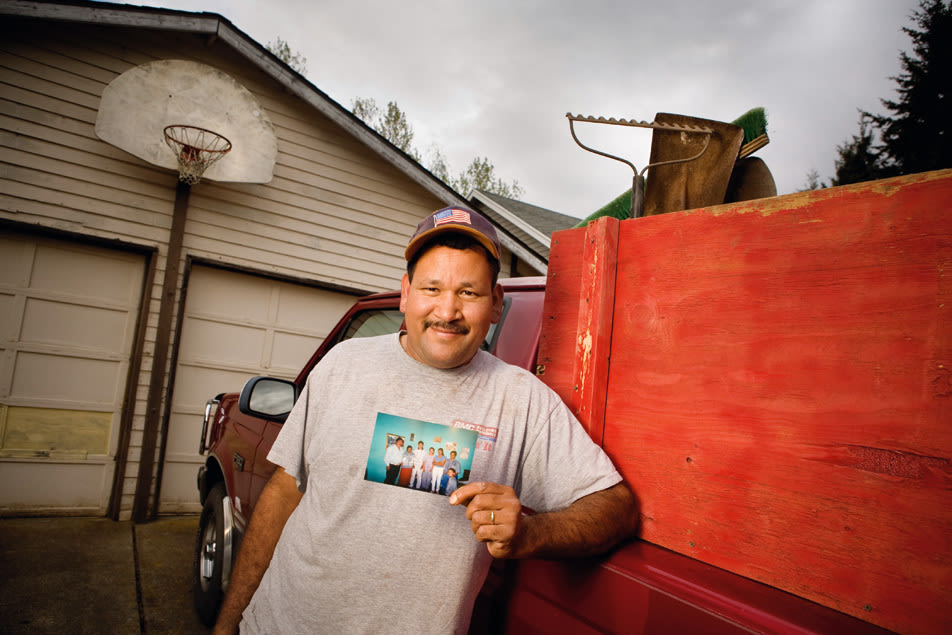
Image: Pete Stone
I LOVED IRÁMUCO, my little village in Guanajuato, Mexico. On one side we have the Zacatecas Mountains, and on the other side we have a great big lake called Lago de Cuitzeo. It’s very beautiful. Very peaceful. Most of the people who live in my village are farmers or fishermen, but no matter what you do, or how much you work, it’s really hard to make enough money to survive.
I’ve been working since I was 7 years old. When I was a boy, I either fished on Lago de Cuitzeo with my dad, or sometimes me and my mama and my two brothers and eight sisters would pick reeds from the lake and weave petates [the mats farmers use to dry chiles] to trade for beans and tortillas. But after my father died in 1989, even though I had a job as a carpenter, we were really, really poor. On Sundays, when I got paid, my mama would buy two little wings and the leg of a chicken, and we’d eat soup, beans, potatoes, and rice for dinner. By the end of the week, when the money ran out, it would be just salsa and tomatillos.
The main reason that I decided to come to the United States was that our house was falling down. The bricks were made out of mud and straw, and the goats we raised for milk and cheese chewed up the walls. The worst part was the ceiling. When we looked up, we could see the sky. Whenever it rained, the dirt floor turned to mud.
On the other side of the lake, there was a town called Villa Morelos, where there lived a coyote. The coyotes, they’re like the mafia. They’re smugglers, smugglers of people. You don’t want to mess with those guys. But one day in April in 1992, me and my best buddy, Miguel, took a bus to Villa Morelos and knocked on the coyote’s door to ask if he could bring us to Hillsboro, Oregon, where Miguel’s father was living. He told us to meet him at the bus station in Morelia, the capital city of Michoacán, and he’d ride with us to Tijuana, where we’d meet more coyotes who’d take us across the border and then to Oregon. We would each have to pay $500; that’s more money than I made in a whole year.
And so my family—my sisters and my brothers and my uncles—pulled together all of our savings, but all we had was 4,000 pesos, around $350. Miguel called his father, and he said he’d loan me the rest when I got to Oregon. My mama sewed the money into the waist of my pants. I left Irámuco on the Wednesday before Easter, wearing just those pants, a T-shirt, a really thin jacket, and tennis shoes. The only thing I carried was a plastic bag with some beans and bread and eggs. That was it. That was my food for the three days it would take to get to Tijuana.
Me and Miguel rode the bus for 40 miles to Morelia, where the coyote was waiting for us at the station. He rode with us for 300 miles through the Sierra Madres, then up the coast for another 1,000 miles north to Tijuana, where we met more coyotes and 20 other guys who were crossing into the United States. We walked into the desert outside of town, and we lay down in the dirt by some bushes right by the border fence and waited for it to get dark. At midnight the coyotes woke everybody up and said it was time to go.
First we had to climb two pretty good-sized fences, like 12 feet high, topped with razor wire. You have to jump from the top, and everybody was falling on each other in the dark. As soon as you land, you have to start running. We crossed a creek and then reached a highway, but La Migra, the border police, were waiting for us in two big Suburbans. They put us in handcuffs and took our shoes so we wouldn’t run away. Then they took us to a jail where they wrote down our names and fingerprinted us. In the morning, they gave us back our shoes, drove us to the border, and told us to stay in Mexico.
The next night we tried again. Over the fences, through the creek, across the highway—we never stopped running. We ran all the way to the ocean and walked along the beach. I couldn’t see the ocean, but I could smell it on the wind. We kept walking for, I don’t know, 70 miles, until we reached San Clemente, California, where more coyotes were waiting for us in three or four cars. Those coyotes drove us to a house in Santa Ana, a suburb of Los Angeles. We were 40 guys in two bedrooms, and we stayed there for two days with only fried eggs to eat.
Then they loaded us all in the back of a van to take us to another house farther north, in Modesto. They told me to lie down on the floor and then they piled five guys right on top of me. When we got to the house, some of the men had to carry me out because my body was really hurt. I couldn’t even move.
Inside the house, a guy says, “Here, have a beer.” I don’t drink, but I took the beer—a Budweiser. The guy, he says, “Brother, welcome to America!”
We left Modesto at 10 that night and we were in Hillsboro by 8 the next morning. At a gas station, the coyote called the house where Miguel’s father was staying, and Miguel’s father came and paid him the $150 I owed. Then we just walked away. Miguel’s father was living in a garage with five other guys, and they were sleeping on the floor, on cardboard. That was pretty sad, but I thanked God that there was at least somebody to help me in the United States.
Me and Miguel found jobs near Klamath Falls. From May to July we lived in a small trailer with a bunch of guys, and picked pinecones for Christmas wreaths for $4.25 an hour. In July I sent my first money order to Mexico, for $800. Right away, my mama started buying the materials to build a new house: mortar and bricks and cement. Every month, I just sent home more money.
In 1995 I found a good job as a mill foreman in Sherwood, and I married an Oregonian, a bookkeeper named Shelley. Five years after I came to the United States, in December of 1997, I flew for the first time in my life and went to see my family. My mama and my grandpa and my auntie, and my brothers and sisters, they all rode in the bed of a pickup truck and picked me up at the airport, and we drove to my village.
When I saw our house, I was so proud: It’s two stories tall and made of concrete that’s painted a pretty light blue. There are flush toilets, hot water, everything. It’s not a big house. It’s not an expensive house, but it’s a good house. All of my tough days were worth it just to see that house.
I became a citizen so I could sponsor my mama to visit the United States. There’s no way she’s going to move here, but I would like her to see how I’m living. I get up in the morning at 3:45; I go to work at the mill; and then I get home at 3:30 in the afternoon, get into my landscaping truck, and go to work again, sometimes until 8 at night. I’m the only Mexican in the neighborhood where I live.
I was 21, almost 22 years old when I left Mexico. Even though I was a grown man, when you leave a village like Irámuco, you cry. I’m 38 years old. And I’m still crying.
Jalal Faks
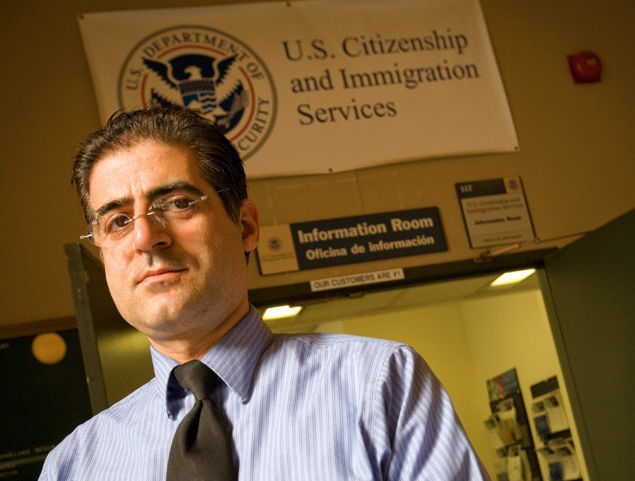
Image: Pete Stone
I’VE BEEN WORKING AT the immigration office since 2002. I interview people to make sure they’re eligible for the benefits they’re seeking, whether it’s naturalization or permanent residency. Most, if not all, immigrants value the principles this country was founded on. That’s why you see the happiness on their faces when they take the oath. They’re proud.
I was born in Syria and grew up in Kuwait. When I was 18, I came here to study chemical engineering at Oregon State University. My dad had a business in Kuwait City selling new and used cars: American cars. Everybody loves American cars in the Middle East, because they can stand up to the weather.
Everything changed on August 2, 1990. I had just come home from class when I turned on CNN and the announcer said Iraq had invaded Kuwait. I watched airplanes bombarding Kuwait City and I’m like, “That’s my neighborhood! That’s where we live!”
My dad lost everything. He watched Iraqi soldiers load his cars onto trailers and truck them north. All of his property, his life savings—it all disappeared.
My brother had married an American, and so he sponsored my dad, my mother, my other brother, and my two sisters to come here. After they arrived in January 1993, my dad became a U.S. citizen as soon as he could. He loved this country, and until the day he died in 2004, he always reminded us how grateful we should be. My dad had lived in Kuwait for more than 40 years, but he was not allowed to become a Kuwaiti citizen because he had been born in Syria.
When my family visits Syria, we say we’re American. We are Arab Americans, but we always say the word “American.” It has become a part of who we are.
When I came home in 2007, the inspection officer at the airport asked me where I had been. I said, “Syria,” and she told me I needed to get an interview with a supervisor. When the supervisor asked me where I worked, he was surprised. He seemed embarrassed. I like to think that most Americans welcome immigrants and respect them and believe that the United States is better because of immigrants, not in spite of them.
Angela Vetanen (with Collin and Baby Claire)
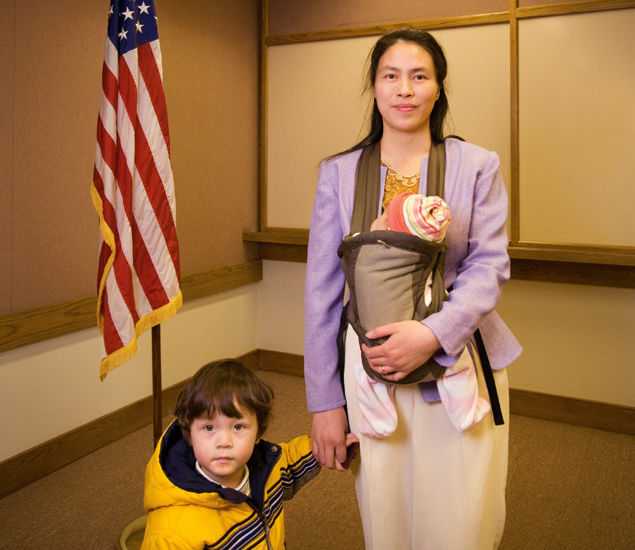
Image: Pete Stone
I LEARNED ABOUT Falun Gong [a Chinese self-improvement practice] in my third year at the technical school in Hengyang, my hometown in Hunan, China. Falun Gong’s exercises are similar to tai chi or yoga. It emphasizes the principles of truthfulness, compassion, and forbearance in daily life.
In 1996 I moved to Shenzhen near Hong Kong and found a job at a factory. Every day, I went to the city park to practice. We’d meet at dawn or in the afternoon, sometimes 40 of us, and we’d spread mats on the ground, do our movements for an hour, and meditate for another hour. When you’re finished, your body feels very light. Your mind feels clear.
In July 1999, Jiang Zemin [the secretary general of the Communist Party] banned Falun Gong and started a crackdown on practitioners. One day the police were waiting for us at the park. They ordered us to leave; those who did not were arrested.
Soon after that, the police came to my apartment and found my Falun Gong books and music tapes hidden under my bed. I was detained for a night at the police station, but I didn’t know there was a security camera in my cell. They caught me practicing and gave me a choice: If I agreed to leave Falun Gong, I could stay in Shenzhen and keep my job. But I said no. I was fired and ordered to return to Hengyang.
After I moved home, my father heard on Voice of America that over 100 practitioners of Falun Gong had died in prisons and labor camps. I thought I should do something, so I went to Beijing. Many were protesting in Tiananmen Square, but I stayed in my hotel room and started writing a letter to the National People’s Congress, saying Falun Gong was good. I took a break, and as I was practicing my movements, I looked outside and saw a man watching me from the roof. I started to pack, but before I could leave, two police officers unlocked the door to my room and found the letter.
At the Beijing police station they put me on a train to a detention center. I was locked in a cell with seven other Falun Gong practitioners. After 20 days, my parents paid 7,000 yuan—10 months of my mom’s salary—for my release. They were forced to promise that I wouldn’t go to Beijing and that I wouldn’t practice Falun Gong.
Since I didn’t have a job, I spent a lot of time on the Internet. I usually went to Bigchurch.com [a religious social-networking site], and one day I read a post by a man named Mark Vetanen, a programmer from Beaverton, who was writing about his experiences at a Buddhist monastery in America. This made me very curious—I didn’t even know there were Buddhists in America! So I e-mailed him, and he e-mailed back.
We wrote to each other once a week, then two or three times a week, then every day. We had webcams, and I remember how strange it was seeing him prepare dinner and here, it was morning. We talked about many things. We discussed our thoughts, we shared our dreams, and eventually I fell in love. One day, Mark said he wanted to bring me to America, as his wife. I said, “Sure.”
A few months later, I met him at the airport in Shenzhen, and we took the train to Hengyang. We were married the next day. There was no ceremony. We just filled out paperwork at the registration office, paid $200, and that was it. My family celebrated at a restaurant where there was karaoke. I sang Mark a Chinese love song. Mark sang “Twinkle, Twinkle, Little Star.” It was the only song on the list he knew.
Many Falun Gong practitioners cannot leave China because they are blacklisted, but for some reason, I was able to get a passport. But I still needed a visa to enter the United States. After Mark returned to Oregon, he sent in the application, but then 9/11 happened and two years passed. But one day I received a letter from Gordon Smith saying that my visa was ready at the United States Embassy. A few weeks later, I left China.
I learned English at Portland Community College. I worked at the deli counter at Fred Meyer and on an assembly line at the Epson factory. But now that I have a baby and a little boy, I stay at home. I’m happy. My life, it’s peaceful. I have freedom to practice Falun Gong, sometimes in Waterfront Park with friends. I’d like to go back to Hengyang so my parents can meet their grandchildren, but I’m afraid that if I go to China, I’ll be put in jail. Collin, my 2-year-old son, doesn’t understand why he can’t ever visit them. He calls them Wai Gong and Wai Pong, the grandma and grandpa who live in the telephone.
Pavel Aleksashin
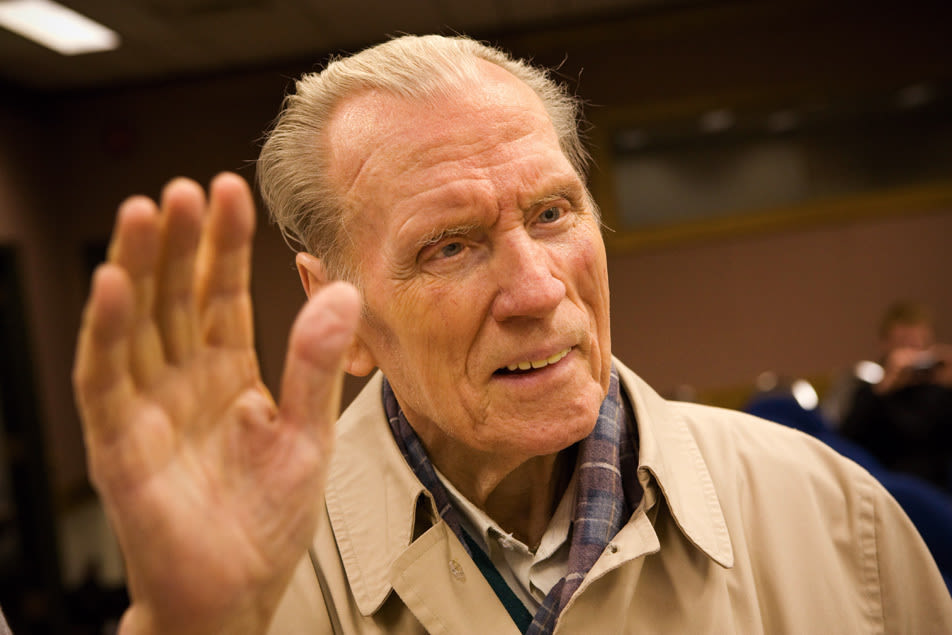
Image: Pete Stone
FOR A LONG TIME, everything was wonderful in Georgia. My wife, Yevgeniya, and I were so very happy. In Tbilisi, we shared a nice three-bedroom apartment with our grown children—a daughter and a son. We had a large pension and some savings. Even though I was blind [Aleksashin was born with poor eyesight that deteriorated over time], we had everything we needed for the rest of our lives.
But in 1991, everything started to fall apart. On April 9, just before the Soviet Union collapsed, Georgia declared its independence and broke away from the motherland. In January, the newly elected president was deposed in a bloody coup, and the new republic became embroiled in a civil war. Warring factions fought for control of the government, and at the same time, separatists in the west and north were fighting for their own independence. The economy collapsed. Factories were shut because they could not get the supplies they needed—in 1994, Georgia’s gross domestic product had shrunk by 75 percent from what it had been five years before. Everything became expensive.
Our pensions no longer covered our needs, and our children lost their jobs. Food shipments to Georgia stopped, and there were long lines in the grocery stores. Sometimes we took the train to a city called Marneuli, near the border of Azerbaijan about 20 miles away, where we bartered bread for fresh vegetables.
We never dreamed that we would leave Georgia, but things really became desperate. We had some relatives in Everett, Washington, who petitioned to bring the entire family to America; a Russian church in Vancouver that had many members from the Georgian city of Batumi offered us a place to live.
So in 1994, when my wife and I were 67 years old, we sold the apartment and everything inside it and made plans to leave for America. We each had three large suitcases that we stitched together ourselves. At the time, there were a lot of criminals robbing people who were trying to leave the country. Because we didn’t want to call attention to ourselves, my wife and I, my sister, one of my daughters, my son and his wife, and their six children all left the apartment at different times.
We took a cab to the Ossetian border high in the Caucasus Mountains, and then boarded a train to Moscow. On June 3, 1994, we left Russia.
At Moscow Sheremetyevo Airport, just before you enter the security area, there is a red line on the floor that separates those who are leaving from those who are staying behind. The younger ones felt cocky—that finally the old life is behind us and the new life is in front of us. But for me, as I crossed that line, I felt a sense of loss. I just knew that I would never be back.
Here in Oregon, I used to enjoy taking long walks around Hillsboro with Yevgeniya, but now that I’m 81 years old, I’m not as active as I used to be. At home, my wife reads to me in Russian from the Bible, or my daughter sometimes reads from magazines like National Geographic. I’m also typing my memoirs.
There’s still a certain degree of disbelief that all of this happened. I became an American citizen because I want to accept this land, and this culture, as my home. And to finally complete the journey I began 14 years ago.
